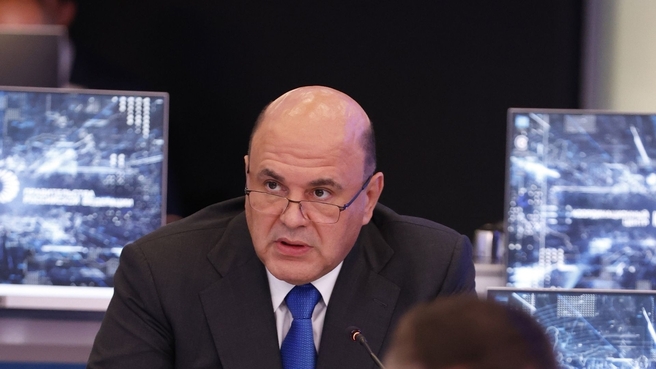
Strategic session on transport
Mikhail Mishustin: “It is important to continue expanding national production in the transport sphere. We also need to continue converting the sector to digital platforms, and, of course, we need to continue to educate skilled personnel.”
Mikhail
Mishustin’s opening remarks:
Good afternoon, colleagues.
We continue with our series of strategic sessions on
the long-term development of key economic sectors. Today, we will discuss our
objectives in transport under today’s new conditions, including our mid-term
and long-term plans. This will allow us to achieve the President’s national
development goals .
A consistent effort in the transport sector is a
mandatory condition for any state to operate efficiently, and this especially
includes a large state like Russia.
It is important to achieve positive changes in all
areas, despite the challenges imposed by the actions of unfriendly states. We
need this to ensure a good life for millions of Russian citizens, to develop
the sector and the entire economy and to maintain this country as an important part
of the global trade system.
The increased external restrictions have also affected
civilian aviation. Unfriendly countries have closed their air space, and there
are some questions regarding high-seas, road and railway routes.
The Government has adopted a number of decisions for
reducing the negative impact on the sector. We envisaged substantial assistance
under this high-priority action plan. The amount of this assistance exceeds 500
billion roubles (about 511.5 billion), including over 120 billion for
supporting the aviation sector. We made this decision at a meeting with the
President.
These and other steps have reduced the impact of the
sanctions on the entire sector. In the first five months of 2022, freight
traffic volumes continued to grow, showing a nearly 2 percent increase or 1.8
percent, to be more exact.
We have retained our air fleet that has over 1,200
aircraft, and some continue to fly abroad. Russia’s aircraft manufacturing
industry is set to build over 1,000 new planes of different types through 2030,
including short-, medium- and long-range airliners, as well as regional planes.
We still need to chart our future priorities for this
sector, and most importantly, we need to modernise it.
We need to make continuing progress in the interests
of passengers and freight companies as stipulated by our Transport Strategy, to
fulfil our obligations in the field of transport mobility and to make the
territories of our large country more accessible and interconnected.
Today, we will also discuss the main goals and
directions of developing an integral basic transport network, including the
five-year programmes that will be linked with global logistics corridors
connecting Russia
with the south and the east. Expanding ties with friendly states is a key
factor in modernising various industries, including agriculture and the energy
sector.
It is important to continue expanding national manufacturing
through transport. I mentioned aviation, but we will also need ships, modern
railway rolling stock using Russian components, as well as lorries, public
transport systems and construction equipment.
We also need to continue the sector’s digital
conversion to reduce costs,
expedite freight and passenger traffic and as a tool for ensuring a more
efficient work flow. And, of course, we need to educate skilled personnel constantly
to retain the sector’s workforce under this external pressure. We need to equip
our universities and vocational training schools with modern Russian-made
simulators and technology, and we need to involve young people in transport
engineering initiatives.
